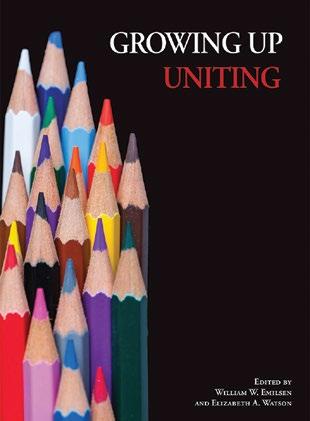
5 minute read
Who is God calling to be the next Moderator?
Who is God calling to be the next Moderator of the Uniting Church in South Australia?
By Rev Rod Dyson
A little over ten years ago I had the privilege of being the Moderator of the Synod of South Australia. It was (mostly) a wonderful experience. As Moderator I visited many congregations in South Australia and a significant number of these were celebrating anniversaries or other significant events. So, churches were full, and people were delighted to catch up with each other again. I met so many faithful people who had uplifting stories to tell. I was greatly encouraged after each visit. The membership in South Australia is a very rich canvas. I also met many from other denominations and staff in schools, agencies and St Andrews Hospital. One of my enduring memories is the prayer support that I received from across the church. This was tangible and a great assurance to me as I was constantly asked to step out in faith. It is now time to begin the process of choosing the next Moderator of the South Australian Synod and I write this article on behalf of the Moderator Nominating Committee. Information has been sent to presbyteries and to the wider church about the nomination process. Nominations must come through the presbyteries so we encourage you to be in communication with them. Presbyteries may nominate more than one person, although there is no requirement for every presbytery to nominate someone. Presbyteries are also welcome to nominate people from outside their presbytery (as long as they are within the Synod of SA). Details of the nomination process including the timeline, the Bylaws that relate to the Moderator, the Nomination Form and the Moderator Role and Person Specification are now available on the Synod website at this link: sa.uca.org.au/moderator-nominations and from the Associate General Secretary, Rev Sue Page, email assocgensec@sa.uca.org.au. Nominations close on the 30th of September 2021 so send your nominations to presbyteries well before then to allow them time for discernment and to forward them on to the Moderator Nominating Committee. Send your nomination to your presbytery and they will continue the discernment. The permission of the nominated person should not be sought before nominating. The Moderator Nominating Committee will contact those whose names are forwarded by the presbyteries.
Nomination process
Access information at sa.uca.org.au/moderatornominations or by emailing Associate General Secretary, Rev Sue Page at assocgensec@sa.uca.org.au
Send nominations to presbyteries before deadline of 30th September 2021
The permission of the nominated person should not be sought before nominating
The Moderator Nominating Committee will contact those whose names are forwarded by the presbyteries My experience is that God calls a particular person to be Moderator for each season of the church. I ask that you pray and discern who God is calling for the next season of our church.
Growing Up Uniting
Edited by William W. Emilsen and Elizabeth A. Watson, Mediacom, Adelaide 2021
by Rev Philip Gardner
William Emilsen has greatly blessed the Uniting Church over the years by editing a series of books on the Uniting Church. There were editions of essays for the twentieth and twenty-fifth anniversaries of Union, another in 2014 and of course his marvellous biography of Charles Harris the founder of the UAICC.
This time he has joined with sociologist Elizabeth Watson to edit a series of reflections by people who have grown up in the Uniting Church. That is, those who were born after Union or whose conscious experience of church has only been the UCA. There are twenty contributors ranging in age from around twenty to lateforties (based on the clues in the essays!). A treasure trove of voices and perspectives. Although the contributors were given areas to consider in writing the essays they were also given the freedom to respond and the resulting essays vary widely in structure, content and tone. My favourites in the book tended to be those essays that were more autobiographical. Often in the sharing of their story, key themes were shared that were paralleled with those essays that were less narrative driven.
Consistently the contributors spoke of their pride of belonging to a denomination committed to justice, especially the mutuality of women and men in ministry, the encouragement of lay ministry, the gift of multiculturalism and the honouring of First Peoples. Other themes were also strong, including the importance of welcome by local congregations, the building of community and the importance of good mentors. Story after story spoke of key people who had invested in their lives ranging from folks in local congregations to tertiary chaplains and other ministers. (Throughout this book I was envious, not for the first time, of the great tertiary chaplaincy program developed by the NSW/ACT Synod.) One of the key themes raised by this book for me is how intentional are we about helping all people, but especially young people, mature as followers of Jesus? What pathways and tools are we using to grow intentional followers of Jesus? For that reason alone this book is worth the investment of your time if you are a leader in the UCA. It was very encouraging to be reminded of significant program in the UCA over the years. Kids and Youth Camp Outs in South Australia, NCYC, About Face and many more. To see how these efforts had a life time impact on those that participated was affirming. Another interesting part of the book is that not everyone was still actively participating in the Uniting Church, yet all seemed to have a deep connection and fondness for the ways in which their lives had been shaped. I came away from this book wondering whether there might be a sequel, with yet more stories, or maybe a webpage with others invited to share their stories with similar discipline. This book is a gift to the UCA, a reminder of our strengths, and where we need to grow. You won’t agree with everyone or everything in this book – but that is part of being Uniting isn’t it?









